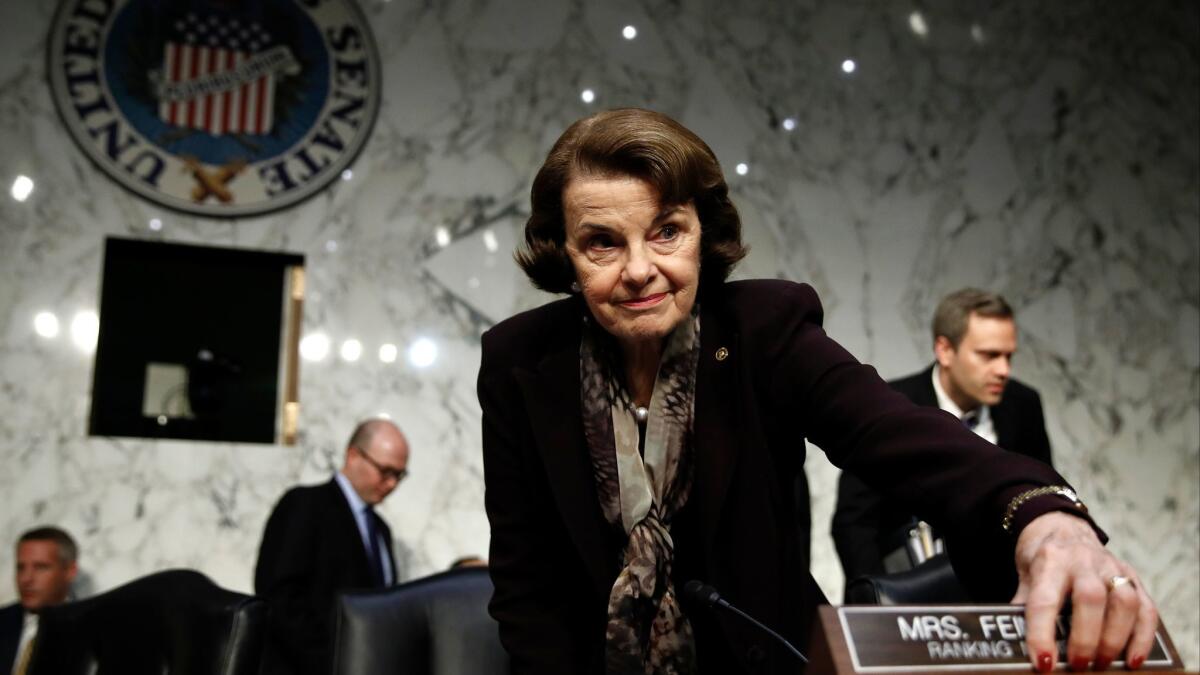Column: There’s a big problem for California Republicans, and it’s this year’s race for the U.S. Senate

- Share via
Reporting from Sacramento — There is something worse than seeing your political party lose — yet again — the race for one of California’s most prominent offices.
It’s when your party’s voters simply don’t show up on election day. And if enough of them simply sit out due to a lack of interest, it can endanger the party’s power for years to come.
That brings us to the U.S. Senate race, where Sen. Dianne Feinstein is seeking a fifth full term. With only days to go before the formal filing season opens, there’s not a single California Republican with any name I.D. who seems prepared to run against her.
If re-elected, the venerable Democrat will almost certainly set the record for the longest Senate tenure of any Californian in history. She won her most recent three races — in 2000, 2006 and 2012 — by an average of almost 23 percentage points. The only close contest was her 1994 nail-biter victory over Republican Michael Huffington. No doubt that weighs on the mind of any would-be GOP challenger.
But 2018 has some unusual markings, none more striking than the challenge mounted by a prominent member of her own party, state Senate President Pro Tem Kevin de León. His strategy seems clear: Try to outflank the often centrist, pragmatic-sounding Feinstein by fanning the liberal flames set by Vermont Sen. Bernie Sanders in 2016 and kept burning by the words and actions of President Trump.
That probably won’t work if a Republican with state party support can motivate their base. “Republicans desperately need a viable statewide candidate in November to bring out their voters,” wrote GOP analyst Tony Quinn in an online column last month.
It’s hard for Republicans to win statewide in California if they don’t have candidates »
If Republican voters skip the race, Feinstein and De León could both advance to November — a replay of the U.S. Senate primary in 2016, although that was caused by a multicandidate field that splintered the GOP vote.
Here’s what also is different: There’s no presidential election to bring out voters this November, though Trump has hardly shown his ability to help. He only received votes on 30% of the ballots cast in California in 2016 — down from the roughly 40% received by recent Republican candidates for president and governor.
This year’s race for governor has three visible GOP hopefuls: Orange County Assemblyman Travis Allen, businessman John Cox and former U.S. Rep. Doug Ose of Sacramento County. But what if they split the June vote and Democrats take the top two slots? That, plus a barren Senate race, would mean no Republican standard-bearer come November.
Under that scenario, Quinn argued in his analysis, “Republicans could easily lose half the congressional delegation and a third of their legislators to a fired up high turnout Democratic base.”
There’s a season for California ballot measures, and this is it »
That creates the kind of anxiety that motivated Republicans last summer to embrace a novel idea, to put their money and muscle behind a November ballot measure to repeal California’s new gas tax increase. The theory is that an anti-tax vote could fire up the base and tip the scales just enough for the party to hang on to most, or all, of its seats in the House.
Still, a strong Senate candidate couldn’t hurt. Not that this unselfish player-to-be-named-later would have much of a chance of actually winning the job. At this point, it’s hard to see how enough wayward Democrats or unaffiliated “independent” voters would be persuaded in the fall to shift the balance of power in a legislative body that could decide the fate of the Trump presidency.
And so the question is whether there’s a Republican out there with the right résumé who also is willing to take one for the team in 2018. If so, he or she needs to step up soon.
Follow @johnmyers on Twitter, sign up for our daily Essential Politics newsletter and listen to the weekly California Politics Podcast
ALSO:
Updates on California politics
More to Read
Get the L.A. Times Politics newsletter
Deeply reported insights into legislation, politics and policy from Sacramento, Washington and beyond. In your inbox three times per week.
You may occasionally receive promotional content from the Los Angeles Times.











